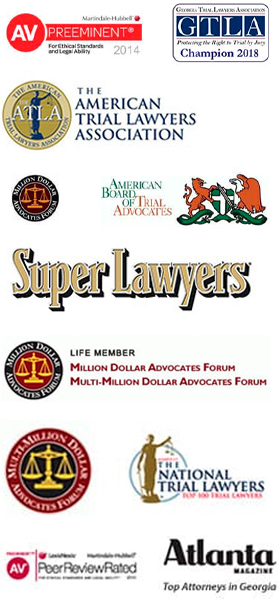What to Know Before Signing an Injury Settlement Offer After an Auto Accident
Getting the first insurance settlement offer after an accident can feel like a relief. You have bills to pay, the accident may have left you out-of-work for a time, and all you need to do is sign. The problem is that you could be entitled to substantially more than what the insurance company is offering you.
The insurance company knows this. They also know you probably aren’t aware of your rights and the full value of your case. They also know you might be too desperate to care.
Should you accept a lowball insurance settlement offer? It depends on your situation, but if it’s one in which you find yourself, our car accident lawyers have some tips on how to respond to lowball insurance settlement offers for injuries.
Required Automotive Insurance Coverage in Georgia
Like most other states, Georgia requires drivers to maintain a certain amount of car insurance coverage to protect themselves and others with whom they share the road. Proof of insurance is mandatory for all motorists, who must carry at least:
- $25,000 for bodily injury per person
- $50,000 for bodily injury per accident
- $25,000 for property damage per accident
Optional Uninsured/Underinsured Motorist (UM/UIM) Coverage
Uninsured/underinsured motorist (UM/UIM) coverage isn’t mandatory, but it’s highly recommended, and insurers must offer it standard with every policy.
Further Reading: Importance of Uninsured Motorist Coverage in Georgia
Minimum Coverage May Not Be Sufficient
In serious crashes or those with multiple victims, the minimum coverage rates may only cover a fraction of the costs. Even if your injuries aren’t catastrophic, you could end up receiving less than your claim is worth by accepting a lowball settlement from the auto insurer.
Why Auto Insurers Offer Lowball Settlements
Here’s why they do it:
- The company only cares about its own bottom line. Insurers profit by collecting and investing premiums and, in turn, paying out as little as possible. Lowball settlements keep their bottom line nicely padded.
- They use auto-computed software. Larger insurance companies are tasked with managing thousands of claims daily. Digital solutions may seem like an expedient solution, but those algorithms aren’t always accurate. They don’t take into account all the unique aspects of your injuries, and the software is obviously going to be designed to favor the insurer as a default. That can lead to low-ball settlement offers or even unfair denials.
- They don’t have all the facts. Adjusters are only human. They might overlook critical facts. Those facts might be missing. Sometimes there is evidence which you yourself may not be aware of.
- Many people just accept it. It pays off for insurers to issue lowball settlement offers because many of those injured in crashes simply accept them, no questions asked. Often, this is simply because they don’t know better or are drawn by the allure of a quick payment.
- It’s a cheap buy-off to your right to sue. Once you sign off on a settlement offer, you effectively sign away your right to pursue further damages – even if you realize later that your actual damages were much higher than what you settled for.
What to Do If You Receive a Lowball Offer After a Georgia Car Accident
There are risks involved anytime you talk to a claims adjuster without an experienced attorney. Know that your conversations are probably being recorded, and you might say something – even the smallest inconsistency – that could damage your claim. No matter how friendly the adjuster is, as an insurance representative, he/she is always going to be working to serve the best interests of the company – not you.
Recognize that a settlement offer isn’t necessarily a fair assessment of your claim’s value. Instead, it’s an offer to resolve your legal claim. It is, in essence, a business negotiation. It’s best to at least consult with a lawyer to see if your claim could be worth much more before agreeing to anything. If you have determined to respond to a low settlement offer yourself, consider the following:
- Stay polite and professional. We understand it’s a frustrating and emotional process. But even if you think the adjuster isn’t being fair with you, yelling or cursing isn’t going to help your case. In fact, it could hurt your reliability as a witness. (This is one reason we recommend working with a lawyer who can handle all the negotiations.)
- Ask questions. Try to figure out why the adjuster reached the conclusion they did. Look for specific reasoning. If your claim is denied, the adjuster must give you a reason. Their answers could be a big help when you go to formulate a counteroffer.
- Offer the facts. Keep records of everything. Your injuries, damage to your car, medical bills, proof that you’ve lost time off work, witness contact information – anything that will help you make a case for fair payment of reasonable damages.
- Put your response in writing. This allows for better documentation if you decide to sue later.
- Don’t be bullied. There is no law that requires you to accept a settlement offer, especially an unfair one.
Bad Faith Settlement Negotiations
Insurers have a legal duty to act in good faith to resolve claims. If they do not, O.C.G.A. § 33-4-6 allows for a bad faith insurance claim in which you could be awarded your original damages plus more than 50 percent of the liability or $5,000 (whichever is greater) plus attorney’s fees.
A low settlement offer isn’t necessarily illegal, but it could be if the company does so in bad faith – without conducting an investigation, causing unnecessary delays, or giving you a clear reason. An experienced auto accident attorney can help you determine if the insurer has acted in bad faith and how to pursue that claim – but the time to do it is before you sign any settlement.
The foregoing answers are not legal advice and are merely a general overview. You are advised to consult a lawyer to address your specific situation. For more information or to inquire about a free consultation, contact Stephen D. Apolinsky, an experienced Atlanta injury attorney, at Apolinsky & Associates at (404) 377-9191 or email him at steve@aa-legal.com.



